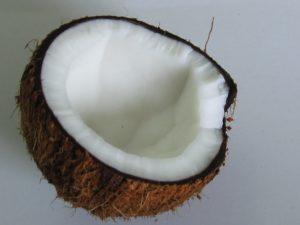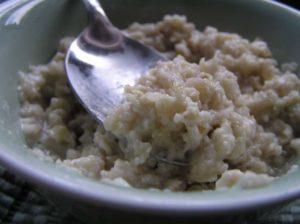 Last week, we talked about oil pulling for healthy teeth and gums – a practice for which coconut oil is especially well-suited. Why? Evidence continues to mount with respect to its antimicrobial effects, particularly with respect to oral pathogens. For instance, a 2012 study by scientists at the Athlone Institute of Technology
Last week, we talked about oil pulling for healthy teeth and gums – a practice for which coconut oil is especially well-suited. Why? Evidence continues to mount with respect to its antimicrobial effects, particularly with respect to oral pathogens. For instance, a 2012 study by scientists at the Athlone Institute of Technology
found that enzyme-modified coconut oil strongly inhibited the growth of most strains of Streptococcus bacteria including Streptococcus mutans – an acid-producing bacterium that is a major cause of tooth decay.
They also found it to be effective against Candida albicans – a fungus that just recently was shown to team up with S. mutans to create tough, persistent dental biofilms (plaque), contributing to tooth decay.
Other research has found that coconut oil may reduce gingival bleeding, pain and inflammation.
But coconut oil’s benefits aren’t restricted to the mouth. It’s been shown to support a healthy heart, immune system and metabolism, as well as proper thyroid function.
Who wouldn’t be a fan?
Well, perhaps those who bought into the dogma spun out of Ancel Keys’ infamous Seven Countries Study: the idea that saturated fat – and coconut oil is 90% saturated – is The Enemy. In fact, it’s nothing of the sort, as highly publicized findings just published in the Annals of Internal Medicine have confirmed. This new research, reported the NY Times,
did not find that people who ate higher levels of saturated fat had more heart disease than those who ate less. Nor did it find less disease in those eating higher amounts of unsaturated fat, including monounsaturated fat like olive oil or polyunsaturated fat like corn oil.
“My take on this would be that it’s not saturated fat that we should worry about” in our diets, said Dr. Rajiv Chowdhury, the lead author of the new study and a cardiovascular epidemiologist in the department of public health and primary care at Cambridge University.
And coconut oil is among the best of them all – so much so that Dr. Glaros makes sure to get a good dose of it into his diet each week. How?
Beyond the daily oil pulling – every morning for 20 minutes – he adds coconut oil to his breakfast several days a week.
 “I have a bowl of slow cooked, steel cut oatmeal each morning,” he says, noting that this method helps retain more of the mineral content of the oats. “So the night before, I put three quarters of a cup of steel cut oats and a cup and a half of water into the slow-cooker after dinner. That way, the oatmeal can soak for 6 hours before the timer starts the slow-cooking process at 2.
“I have a bowl of slow cooked, steel cut oatmeal each morning,” he says, noting that this method helps retain more of the mineral content of the oats. “So the night before, I put three quarters of a cup of steel cut oats and a cup and a half of water into the slow-cooker after dinner. That way, the oatmeal can soak for 6 hours before the timer starts the slow-cooking process at 2.
“By the time I get up at 6, they’re done.” He then adds 3 tablespoons of coconut oil and 2 tablespoons of butter, along with an ounce of dietary hemp and some organic apple juice for texture.
Stir in some currants, raisins and dates, and you have one heck of a hearty – and healthy – breakfast! Give it a try and see what you think!
Images by Chandrika Nair & sleepinyourhat, via Flickr